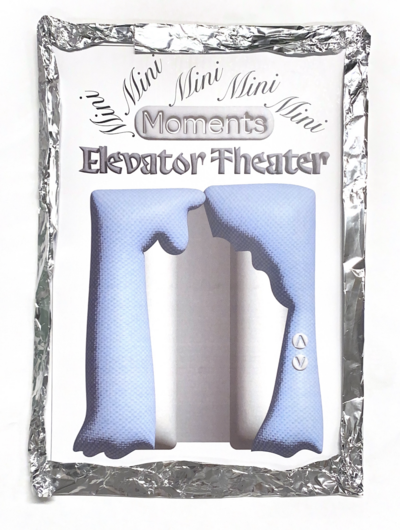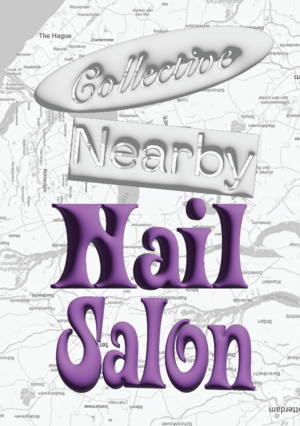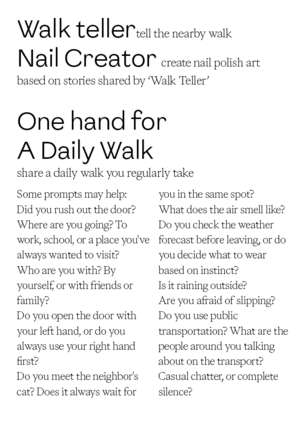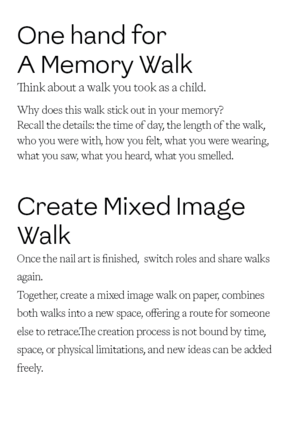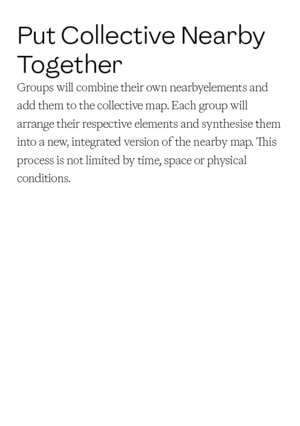User:ZUZU/Pre Assessment
⊹₊⟡⋆ 𝙿𝚛𝚎 𝙰𝚜𝚜𝚎𝚜𝚜𝚖𝚎𝚗𝚝 ⊹₊⟡⋆
𝚆𝚑𝚢
𝚃𝚑𝚎 𝚍𝚒𝚜𝚊𝚙𝚙𝚎𝚊𝚛𝚊𝚗𝚌𝚎 𝚘𝚏 𝚖𝚢 𝚗𝚎𝚊𝚛𝚋𝚢

This photo was taken in an apartment where I used to live for over three years. I like to capture moments when I notice elderly people wearing outfits with quirky or unusual patterns.At the time, this lady was waiting for the elevator with me, and I took this shot discreetly. |
𝙼𝚢 𝚗𝚎𝚠 𝚗𝚎𝚊𝚛𝚋𝚢 𝚜𝚎𝚝-𝚞𝚙

Through the Rain Receiver, we analyze the language of nature by receiving the frequency of rain to generate sounds. As survivors touch the Rain Receiver, they become part of the ongoing narrative. The act of touching the receiver is an intimate gesture, akin to the act of giving. This interaction triggers a cascade of experiences – the sound of rain, snippets of stories, and stream-of-consciousness memories collected from the community. |

Specially designed for adults prone to embarrassment. EmoHooHoo supports the outward expression of unspoken emotions in public places; once you wear this device, it clumsily reflects your emotional changes, whether you like it or not 💨💨💨 In urban life, emotional expression is confined to specific occasions, often requiring an entry fee. To achieve emotional freedom in a consumer society, we must first dissolve this embarrassment. EmoHooHoo helps you break free from societal constraints. If burdened, attribute responsibility to our device💨💨💨 |

While walking in Rotterdam and engaging in activities like observation lists and coded walking, I find unconventional behavioral patterns intriguing. I am exploring my connection with this city by deviating from traditional map representations, discovering how unconventional walking can forge connections within typical routes (such as from home to school or home to the market). |
𝚆𝚑𝚊𝚝
𝚆𝚘𝚛𝚔𝚜𝚑𝚘𝚙𝚜
Focuses on uncovering hidden rituals; participants share micro-stories of their lives or present daily performances in an alienated space
𝚠𝚘𝚛𝚔𝚜𝚑𝚘𝚙𝟷 𝙼𝚒𝚗𝚒 𝙼𝚘𝚖𝚎𝚗𝚝: 𝙴𝚕𝚎𝚟𝚊𝚝𝚘𝚛 𝚃𝚑𝚎𝚊𝚝𝚎𝚛
Mini Moment: Elevator Theater is an interactive exploration of how we inhabit shared spaces and express ourselves through body language and behavior. This project invites participants to reflect on their own experiences in the elevator, a small but intimate environment that often brings out different aspects of our personalities. |
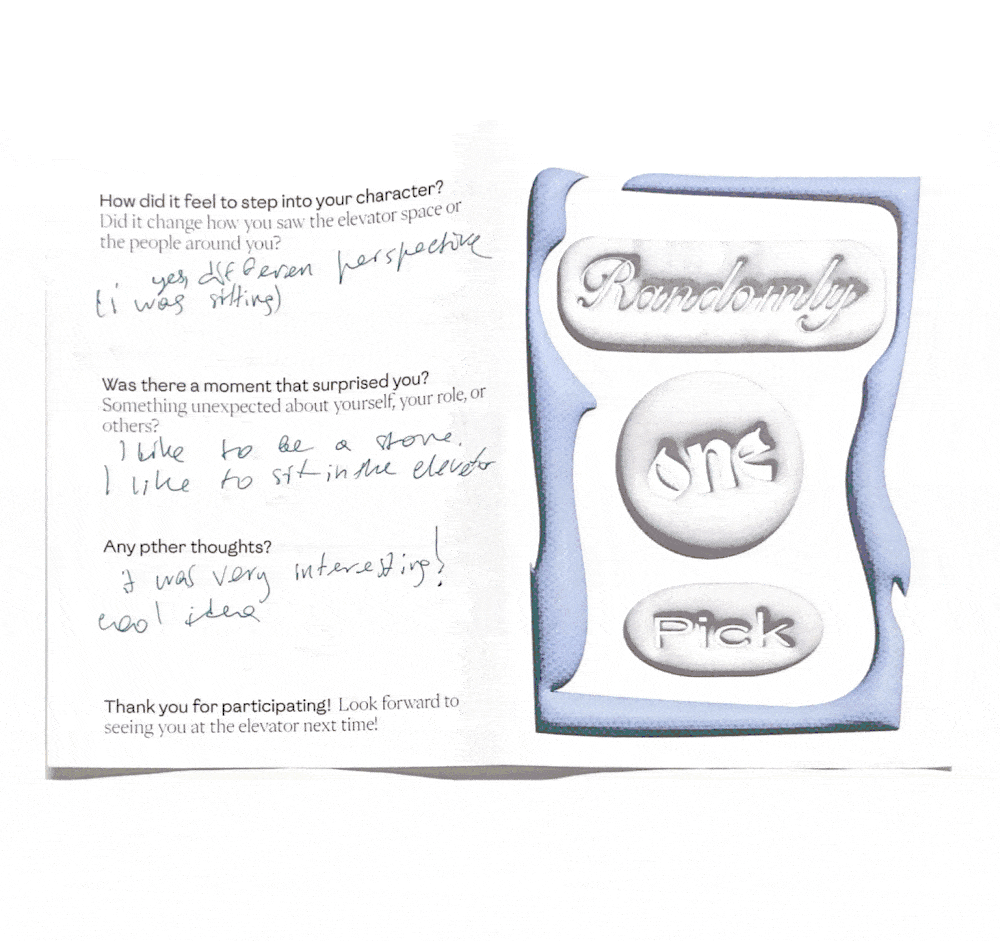
𝚠𝚘𝚛𝚔𝚜𝚑𝚘𝚙𝟸 𝙲𝚘𝚕𝚕𝚎𝚌𝚝𝚒𝚟𝚎 𝙽𝚎𝚊𝚛𝚋𝚢 𝚂𝚊𝚕𝚘𝚗
Taking ‘Cantina’ as a space, I transformed it into a nail salon, here many of the nail technicians are Asian women who give the space a unique energy in their daily labour. By applying nail polish, sharing daily stories, and creating a mixed walk map, I invite participants to experience the ‘ nearby’ feeling and to express their personal and collective experiences of the ‘ nearby’ in this alienated space. |

𝚠𝚘𝚛𝚔𝚜𝚑𝚘𝚙 𝚝𝚘 𝚋𝚎 𝚌𝚘𝚗𝚝𝚒𝚗𝚞𝚎
𝚂𝚎𝚕𝚏-𝚕𝚒𝚏𝚎 𝚙𝚛𝚘𝚝𝚘𝚌𝚘𝚕
Based on the insights gained from thesis and workshops, I will continue to implement small, self-designed life protocols, experimenting with and documenting subtle changes in my everyday routines.
𝙴𝚕𝚎𝚟𝚊𝚝𝚘𝚛 𝚂𝚞𝚗𝚏𝚕𝚘𝚠𝚎𝚛 𝙿𝚛𝚘𝚝𝚘𝚌𝚘𝚕
Each time I step into an elevator, I will smile at everyone—a simple yet often overlooked gesture. This is an experiment to observe how such a small action can transform the atmosphere in a confined, shared space. I will carefully document people’s reactions as I carry out this practice.
The aim is to explore proximity—what happens when we intentionally allow ourselves to be seen and acknowledge others during fleeting moments of shared presence. Elevators serve as a micro-theater of everyday life, and in this unscripted performance, I take on the role of the Sunflower.
𝚁𝚘𝚕𝚎-𝚙𝚕𝚊𝚢 𝚐𝚊𝚖𝚎𝚜
In a fictional country, an unintelligible language will be spoken, a dice-rolling mechanism will be used to randomly assign identities, and the challenges faced by players will vary according to their assigned identities. These challenges will integrate my thesis findings, including exploring the daily lives of my female ‘internet neighbours’ through personal interviews and data collection from Chinese social media.

